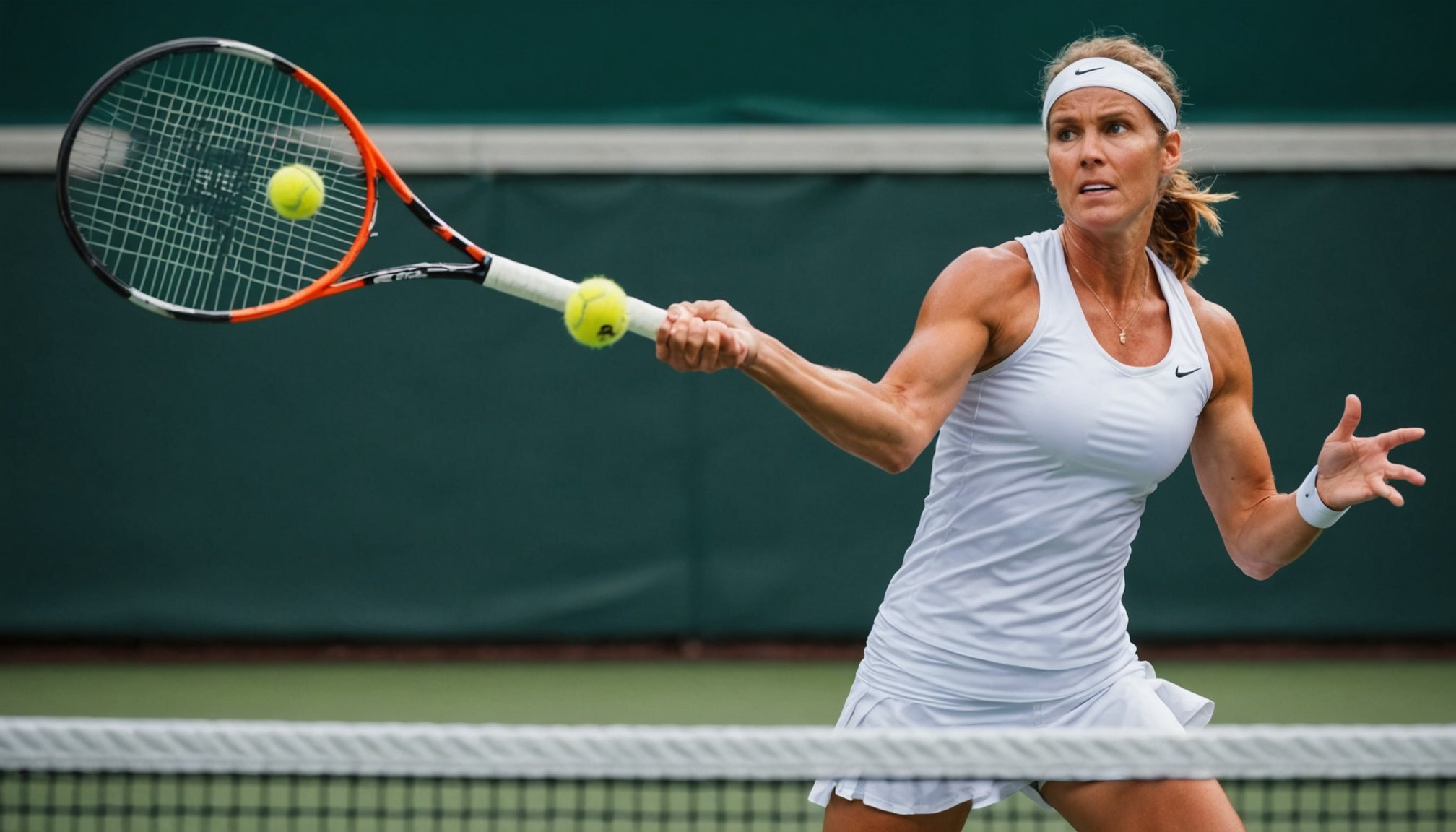Innovative Dietary Approaches for Tennis Elbow Recovery
Successful recovery from tennis elbow is not just about rest and physical therapy; it also involves strategic dietary changes to support tendon health. Understanding the influence of nutrition strategies in this context can significantly enhance recovery rates.
Nutrients such as protein and omega-3 fatty acids play a pivotal role in tendon health. They assist in repairing damaged tissues and reducing inflammation, making them essential components of any tendon recovery plan. Protein is crucial since it provides the building blocks needed for muscle repair and growth. Omega-3s, found abundantly in fatty fish, offer powerful anti-inflammatory properties, which can be particularly beneficial for reducing pain and swelling associated with tennis elbow.
Also to read : Quenching the mind: how hydration enhances mental performance in long-distance running
Food recommendations for those aiming to boost tendon recovery should include incorporating lean meats, lentils, nuts, and seeds into your meals. These foods are rich in the necessary nutrients that support effective recovery. Additionally, fatty fish like salmon, sardines, and mackerel provide generous amounts of omega-3s, helping to expedite the healing process.
Integrating these nutrition strategies into your daily diet can make a significant difference in recovery outcomes, reminding us of the critical role that diet plays in holistic health management. By eating the right foods, you support your body’s natural healing capabilities, fostering a more comprehensive approach to rehabilitation.
This might interest you : Revolutionizing sports injury prediction: harnessing ai for a smarter future
Essential Supplements to Enhance Recovery
Incorporating supplements for tendon healing can significantly enhance recovery from tennis injuries. Supplements such as omega-3 fatty acids, turmeric, and glucosamine are particularly beneficial. Omega-3s, beyond their dietary sources, are available in concentrated fish oil capsules, providing anti-inflammatory benefits essential for reducing pain and swelling. Turmeric, known for its curcumin content, is a potent anti-inflammatory supplement that can aid in decreasing inflammation.
Impact of Anti-inflammatory Supplements
Anti-inflammatory supplements are pivotal in managing symptoms and supporting recovery. Turmeric and fish oil not only reduce inflammation but also promote overall tissue health, accelerating the healing process. Regular intake of these supplements should be paired with an appropriate lifestyle to maximise their effectiveness.
Supplement Dosage and Timing
For optimal impact, it’s important to follow guidelines regarding recovery supplements. Fish oil supplements are typically recommended at doses ranging from 1,000 to 2,000 mg daily. Turmeric should be taken around 500 mg twice daily, ideally with meals to enhance absorption. Timing these supplements in relation to physical activity can also aid in better handling of exercise-induced inflammation, making recovery smoother. It is advisable to consult a healthcare professional to tailor supplement intake to individual needs and ensure safety.
Hydration and Its Impact on Recovery
Hydration plays a crucial role in the recovery and overall health of tendons. Proper fluid intake is essential for maintaining the elasticity and resilience of tendons, especially during the recovery phase. Staying hydrated helps increase blood flow to the tendons, which can expedite repair processes and reduce inflammation.
Recommendations for Daily Water Intake
For optimal tendon health and recovery rates, athletes should aim to consume at least 3 litres of water daily. Adjustments may be necessary based on factors such as climate, activity level, and personal health requirements. Consistent fluid intake not only supports cellular repair but also helps in the removal of metabolic waste from tissues.
Hydration Strategies for Enhanced Effectiveness
Implementing effective hydration tips for athletes can significantly augment physical therapy outcomes. Begin physical activities with adequate hydration and continue to sip water during exercises to maintain optimal fluid levels. Post-session hydration aids in recovery, reducing muscle soreness and promoting tendon health. For added benefits, incorporate hydrating foods such as cucumber or watermelon, which contribute to daily fluid intake while providing additional vitamins and minerals. By prioritising hydration, athletes can ensure prolonged tendon health and improved recovery, making it a vital component of any rehabilitation plan.
Integrating Nutrition with Physical Therapy
Understanding the synergy between nutrition and physical rehabilitation is crucial for anyone dealing with tennis elbow. As rehabilitation exercises aim to restore strength and mobility, a well-supported diet ensures the body has the necessary nutrients for healing. Before therapy sessions, consuming foods rich in carbohydrates and proteins can fuel workouts and support tissue repair. Quick snacks such as a banana with peanut butter or a protein smoothie can provide energy and nutrients.
Post-exercise, the focus should shift to muscle recovery and replenishing lost nutrients. Foods including chicken breast, quinoa, and steamed vegetables offer a combination of proteins and complex carbohydrates that aid recovery. Supplements can further help; athletes often turn to branched-chain amino acids (BCAAs) or protein powders to simplify nutrient intake post-workout.
Examples of successful integration abound. In one testimonial, an athlete who combined a tailored nutrition plan with physical therapy observed quicker recovery and sustained improvement over time. By aligning dietary intake with rehabilitation efforts, you maximize your body’s potential to heal and strengthen, optimising long-term outcomes. This holistic approach recognises food and exercise as partners in injury recovery.
Long-term Nutritional Strategies for Injury Prevention
For athletes, sustaining optimal tendon health and preventing recurring injuries demands strategic dietary habits. Consistent nutrition strategies play a key role in fortifying the body against potential stressors. Incorporating a holistic dietary approach can significantly impact long-term wellness and injury prevention.
Injury prevention through nutrition focuses on maintaining balanced intake. Proteins, omega-3 fatty acids, and antioxidants are integral to reinforcing tendons. These nutrients assist in both recovery and prevention, reducing inflammation and enhancing resilience. Whole foods such as lean meats, fish, and a variety of fruits and vegetables should be staples in an athlete’s diet to support tendon integrity continuously.
Monitoring dietary habits becomes crucial to adapt to changing physiological needs over time. An approach that includes periodic assessments by nutritionists can help athletes fine-tune their diet. Adjustments might be needed as training intensity, goals, or even environments shift. Emphasizing nutrient-dense foods while minimizing processed foods facilitates injury prevention.
Additionally, an understanding of how nutrition impacts the body enables athletes to make informed choices, laying the groundwork for a proactive and intelligent approach to health. By embedding these principles, athletes build a foundation for not only injury prevention but also enhanced performance and longevity in their sporting endeavors.

